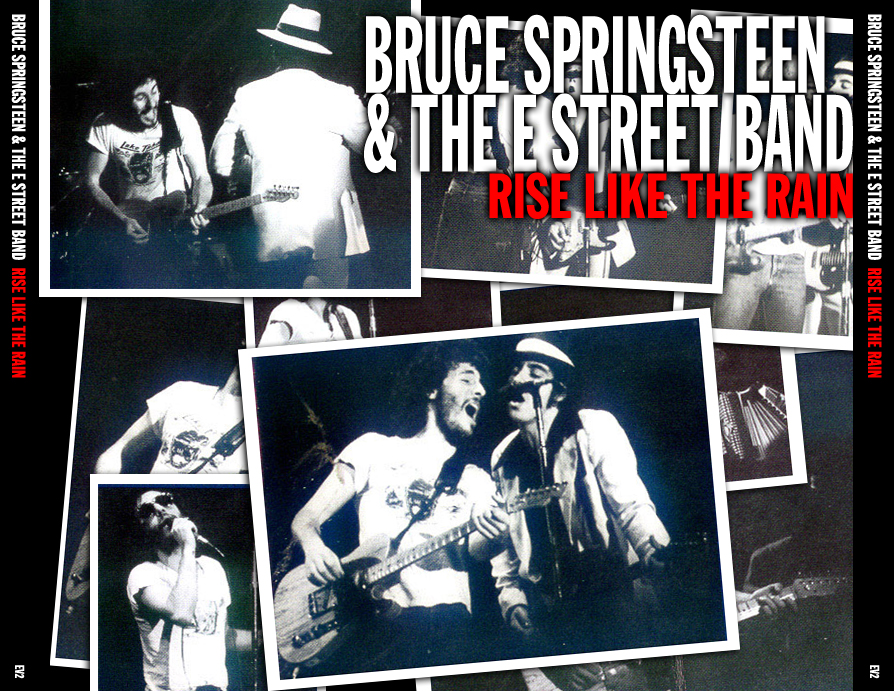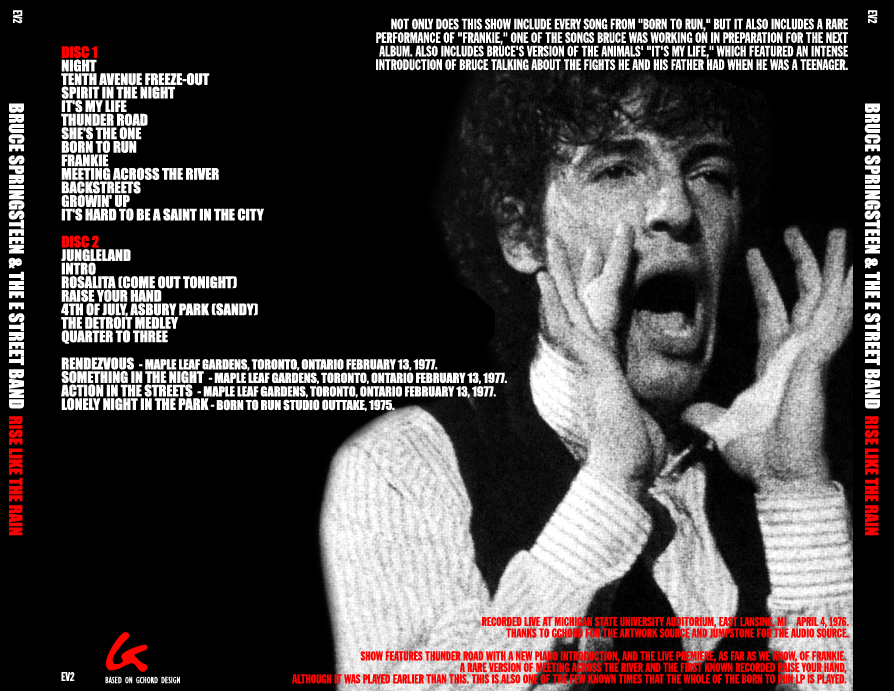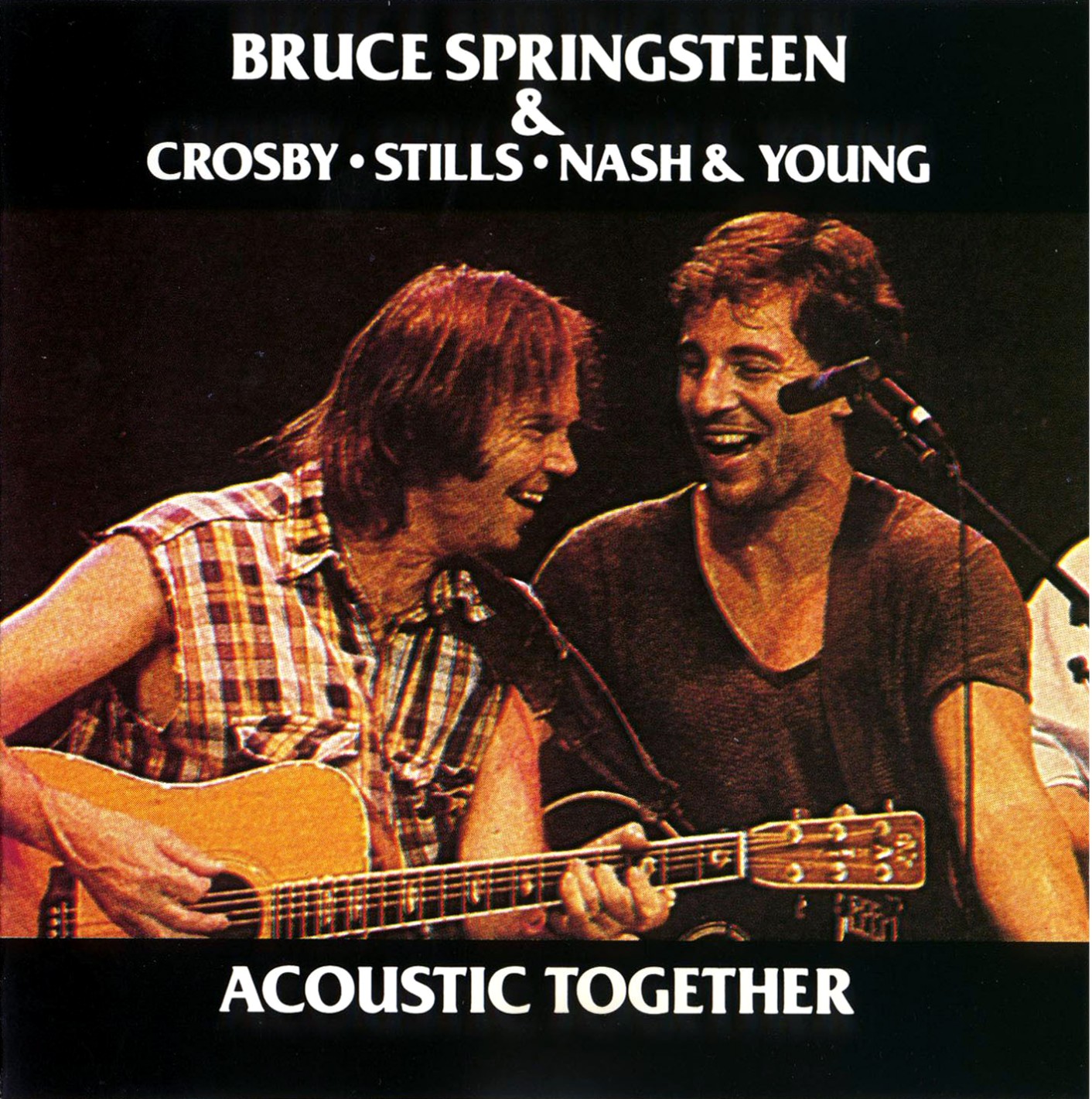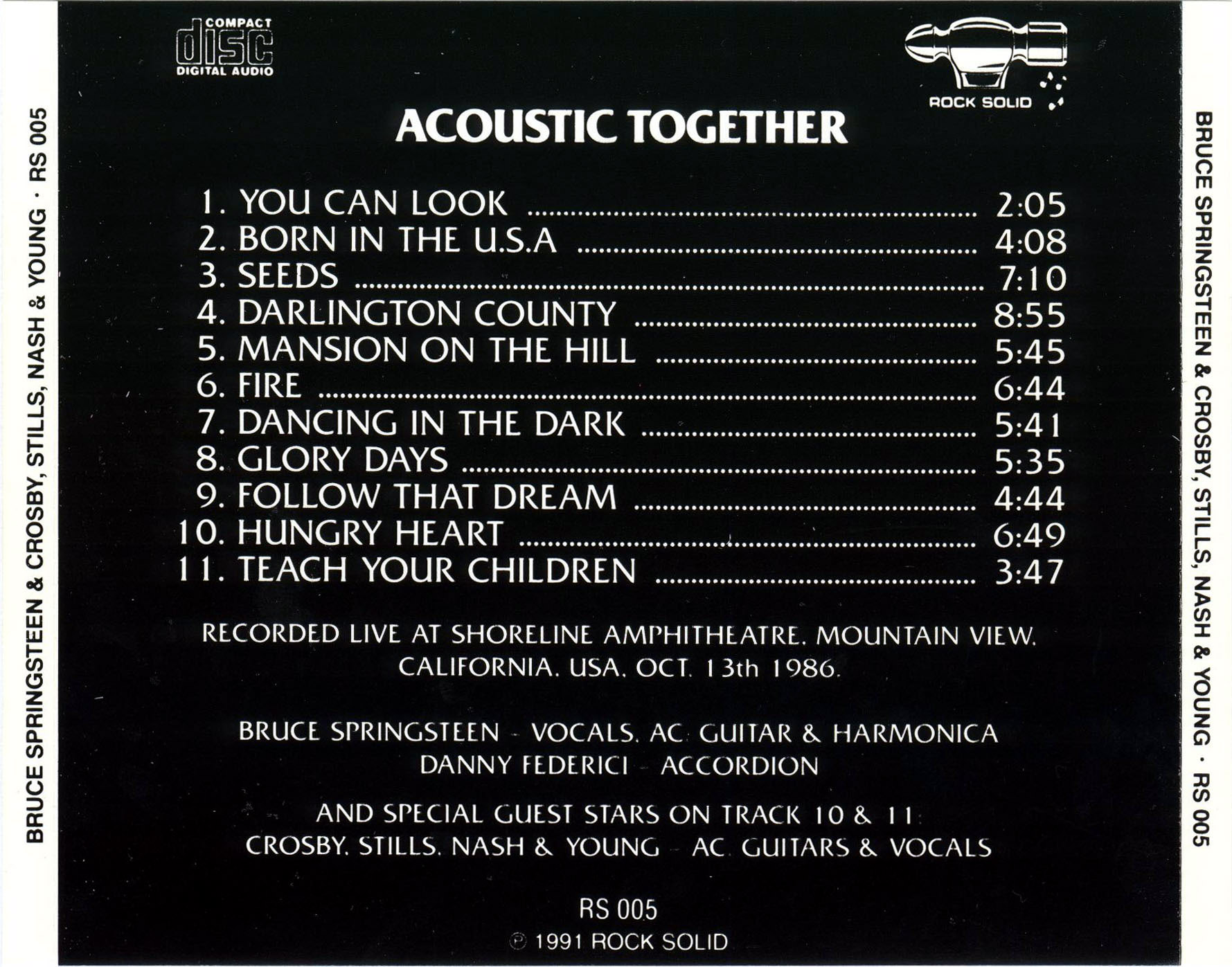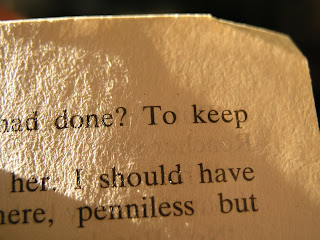
In a starless November New York night in 1971, high above the streets in a busy Madison Avenue songwriting factory, the first face-to-face meeting of Bruce Springsteen and Mike Appel took place.
APPEL: Springsteen comes up to the writers’ room of the Wes Farrell Organization. He was wearing ripped-up jeans and a T-shirt. He said he wanted to get an album deal with a major label. I remember he looked at me and said, “I’m tired of being a big fish in a little pond. ” “Fine, ” I said, “let’s hear what you’ve got. ” So he sat down at the piano and played only two songs. The first was the most boring thing I’d ever heard in my entire life. But the second had something. It was a song about dancing with a girl who was deaf, dumb, and blind with a Iyric that included, “They danced all night to a silent band…. “
It was a very weird line and stuck in my head, as did the way he sang, with an intensity I couldn’t believe. I was sitting right on the piano bench next to him and could see the side of his face as he sang And let me tell you, he sang that song like his life depended on it.
Still, I didn ‘t feel the earth moving beneath me. I thought to myself, let me just be polite. So when he finished, I said, “Look, first of all, if you want an album deal, you have to write more songs. You can’t just have two songs. ” Plus, I told him these were the worst two songs I ever heard, utterly devoid of any pop potential. Instead of being incensed, he said, “Well, I’m going to San Mateo to see my folks for Christmas. I’ll write some more songs and come back.” I said, “Great, the door’s always open.
SPRINGSTEEN: [At that first meeting there was]me and Tink, Mike [Appel], and Jimmy Cretecos. Tinker introduced us. He said, “Mike, this is Bruce. ” Mainly, I just remember playing some songs on the piano. Mike said, “I like the songs a lot. They’re great. ” I told him I was going away to California. I’d decided to get out of the area [New Jersey] for a while. I was having personal problems at the time with girls and things. It was just a good time to get away. I saw my folks for a while. [The band] continued working Steve [Van Zandt] came in and kept the organization together…. It was sort of my band. I never really broke it up when I left. I sort of said, “I’ll see you. Maybe I’ll be back. “
Bruce returned to the East Coast in February of ’72. Three months had passed since his first meeting with Appel.
APPEL: He called back sometime in February, and I totally forgot who he was. My secretary said to me, “There’s this guy by the name of Bruce Springsteen on the phone. ” I told her I didn’t know any Bruce Springsteen. “Well,” she said, “he knows you. ” “Tell him I never heard of him, ” I said, figuring that would be the end of it. A few seconds later she came back and said, “Look, he insists he knows you. He said something about a guy named Tinker. ” “Oh, that guy, ” I said. “Sure, I’ll talk to him. “
So I picked up the phone and said, “Hi, how you doin’?” “Okay, ” he said. “I got these songs, I think you’ll . . . Iike ’em now. ” “Fine, ” I said. “Come on up. ” He came up that night and told me he had songs ready to record, a whole album’s worth. I was there, Jimmy, and Bob Spitz, the writer, who at the time was working for me.
Bruce started off with a song he’d written he called “[It’s Hard to Be a] Saint in the City, ” which had the following lyric:
With my blackjack and jacket And hair slicked sweet Silver-star studs on my duds Just like a Harley in heat . . .
When he finished the song, before I told him how great I thought it was, I asked him if he ‘d sing it one more time. This time when he finished, I just looked at him and repeated out loud, slowly, “Like a Harley in heat, ” and told him I thought that was the most amazing lyric I ‘d ever heard in my life. Then he played six or seven others with the most poetic, potent, and powerful lyrics I’ve ever heard to this day. “For You ” was one of them. “Henry Boy, ” “The Angel, ” “If I Was the Priest” were a couple of the others. By this time I was listening to a voice in my head saying, ” Why me ? ” I mean, I ‘m sitting there in this big commercial firm knocking my brains out banging my head against the wall when suddenly this wonderful, talented guy walks into my life. I remember thinking to myself, he should be in Albert Grossman ‘s office, not mine.
Still, I said to Bruce, “Look, all I can tell you is I want to go forward. I want to take your songs around to record companies, I want to do this, I want to do that, I want to do it all. Come in tomorrow and we’ll talk some business, okay?” The next day he came back, and I told him I wanted to sign him up. “Bruce, ” I said, “I don’t think you’re going
to find anybody who’s going to love your stuff any more than I do. You’ve seen both sides of me. When you played songs I didn’t like, I told you they sucked, they were horrible, and when you came back, I told you they were great, so you have to know that I’m being straight with you. If you know anybody else who ’11 bust his ass any harder for you, you ought to go straight to ’em. “
A week or two later he signed up, and we were off to the races.
SPRINGSTEEN: I didn’t say anything He said he had a contract. If we were going to do anything, before we do anything, I have to sign it. It was a basic deal, he said. I took it, looked at it once, and brought it back [about a week later]. I told him I didn’t know. He said, like, “Come on.” We did that for a while and I signed them.
In March of 1972, Appel resigned from the Wes Farrell Organization. Cretecos, who’d never actually worked directly for Farrell, formed a corporation with Mike. They agreed on a straight fifty-fifty split, including publishing and production, all to come under the umbrella of Laurel Canyon, Ltd. Springsteen signed three separate contracts with Laurel Canyon over a period of three months between March and May of 1972.
The first, in March, was a recording contract. The second covered publishing, and the third was a management contract. The terms of the recording (production) agreement gave Appel’s company exclusive production rights to record Springsteen, in return for 3 percent of the suggested retail price of all records sold in the United States, and 1.5 percent of all foreign retail sales (figures to escalate with each album to 5 percent within a three-to-five-year time span). The production deal Springsteen received from Appel was competitive because the artist was brought to the label. When that occurs, the independent producer, being a part of the original deal, gets a higher percentage than if the label adds its own producer after the artist has been signed. In that instance, money and royalties have to be taken from the original deal to pay the new producer.
A P P E L: I came up with the name of the company. People think I knew about California ‘s Laurel Canyon, which I didn ‘t at the time. What happened was, I passed a record store on Broadway in New York City, and in the window I saw Joni Mitchell’s album Ladies of the Canyon. The same day, Jimmy called me from Newton, Massachusetts, where he spent a lot of time working for Emerson Electronics, picking up some extra money being the house electronics whiz kid. It was the fall of ’71, and he wanted me to come up and see the laurel because it was really beautiful this time of year. The word laurel stuck in my head, along with canyon. So, in March of ’72, when I was trying to come up with a name, I just put them together. In fact, our original name was Laurel Canyon Productions, until a name search indicated a Laurel Canyon Productions already existed, which is why we changed it to Limited. Sioux City Ltd. would later become the music company and Laurel Canyon Management the management arm.
Now, I liked Jimmy. He was very quick-witted, funny, and a very talented guy, a tech-head who loved to work the console knobs, while I couldn’t care less about that stuff. So the way we set things up, I handled the daytime operation. In fact, Jimmy stopped coming to the office, preferring to stay at home and putter around the house in Suffern, New York. He’d just gotten married, and his wife wanted him around a lot.
The second of the three contracts was signed by Springsteen in May. This was the songwriter’s agreement between Bruce and Sioux City Ltd., the publishing arm of Laurel Canyon, Ltd. It should be understood that almost all professional songwriters today sign co-publishing deals with some major publishing house at the time they get a legitimate recording contract. In that way, the publishing subsidiary operates for the artist like a bank, advancing monies against future royalties. A major record label and its publishing arm protect their relationship/investment in new and upcoming talent by acquiring control of more profit centers. In 1972, however, it was still possible for an artist to get a deal without having to include his publishing as part of the overall package.
There is what’s known in the industry as “mechanical” income, a royalty paid from the record company to the publisher for every song it controls on every album sold. If an album has ten of a publisher’s songs, the publisher receives ten separate payouts. Twenty years ago (when Springsteen signed his deal with Appel), the
standard industry figure was approximately four * Later changed to Laurel Canyon Music, Ltd.
cents per song (it is 6.50-6.75 cents today). The normal practice (although not by legal statute) when a publisher wholly acquires an artist’s song catalog is an equal split between publisher and composer. The other form of income from publishing is “performance,” or airplay, royalties (as opposed to mechanical royalties, which are paid by the record company from record sales). In the United States, the two largest licensing organizations, ASCAP and BMI, monitor virtually all songs played on the radio, in concert, and on TV, and they pay out direct royalties, again equally split, between publisher and composer.
Mike Appel has often been accused of using undue influence to persuade Springsteen to sign over 100 percent of his publishing rights to Sioux City Ltd. While it’s true that Appel and Cretecos did acquire 100 percent of the publishing, that meant that as publisher, Appel’s company was entitled to and received only its full contractual share of 50 percent of the royalties, with Springsteen receiving the other 50 percent. Springsteen, having signed with ASCAP, received his checks directly from ASCAP, identical in value to those received by his publisher (until 1983, when he bought out Sioux City and became the sole owner of his entire song catalog).
One thing Appel didn’t do, which many other rock managers did and still do, was to put his name on Springsteen’s songs as one of the composers in order to cut himself in on the writer’s piece of the publishing pie. Springsteen is one of very few successful rock acts who writes almost all his own material, without partners or collaborators. The other who immediately comes to mind is, of course, Bob Dylan, who except for a very occasional collaboration has written all of his own songs. Lennon/McCartney, Jagger/Richards, Henley/Frey, Sting and The Police—all shared their writing credits and, subsequently, their royalties.
During Appel’s time, Springsteen never included the E Street Band as coauthors. During the band’s long association with Springsteen, they remained on fixed salaries. Perhaps one reason Bruce kept them on as long as he did was simply that they were a great bargain. Not being cut in on any of his publishing, they were, in effect, salaried (albeit handsomely remunerated) employees. (By comparison, the relatively brief run of The Police may have been due in part to Sting’s having to share his publishing profits with the other two members of the group, even though he did most of the writing and was the most visible of the three.)
A P P E L: It ‘s important to remember that in the beginning it was all academic because there wasn’t any real money, as we got relatively little airplay and had no real sales until ’74, ’75. As a practical matter, when publishing money came into the company, say eighteen or twenty thousand dollars on a publishing statement, we’d take the whole thing and use it to keep the band and the office afloat. It all went into one pot until late 1975, and Bruce always knew it. I’d give him a financial statement, and he’d ask me why he didn’t get any money, and I’d explain how we’d used it to pay everyone’s bills. He’d shake his head and say okay, and that would be the end of it.
The third contract Bruce signed, in May of ’72, was the management contract. According to rock critic Dave Marsh in Born to Run, Bruce “signed a long-term management contract only a few days [after the second meeting with Appel], on an automobile hood in the unlighted parking lot of a bar,” which implies the signing was a hasty, un-thought-out act done under pressure. In fact, it took nearly three months—from March to May—for Bruce to finalize his management contract negotiations, which came after he’d signed separate publishing and production contracts with Appel. Further, the management contract wasn’t “long-term,” but a then industry-standard five years. And finally, it wasn’t the management contract Bruce signed on the hood of a car but the separate Laurel Canyon/CBS record production deal. This deal, which Appel, through his production company, made with Columbia, was for 18 percent of wholesale (9 percent retail) record and tape sales. The Laurel Canyon end of the deal was split equally among Appel, Cretecos, and Springsteen. They each received 6 percent (with Springsteen’s escalating against theirs annually). The longer Springsteen survived on Columbia, the bigger his piece would be.
Still, one of the most long-lasting and damaging attacks on Appel, and the reason most often cited for the split
between him and Springsteen, has been (and continues to be) that the management contract Bruce signed gave Appel 50 percent of all monies Springsteen earned. Here, for the first time, is Mike Appel’s testimony regarding the matter, taken directly from his sworn deposition that was part of the pretrial procedures in the 1976 landmark lawsuit Laurel Canyon, Ltd. vs. Bruce Springsteen,CBS, Inc., and Jon Landau.
Q: Can you recall the substance of anything you said to Mr. Springsteen about the terms and conditions of the original management agreement and the record production agreement at this third meeting that you are now testifying about? A: The only thing specifically I can remember is that we altered the commission in the management agreement, which was originally 20 percent.
Q: What did you say to Mr. Springsteen about the management commission, and what did he say to you ? A: I told him I was under the impression that Elvis Presley and Colonel Parker had a fifty-fifty management arrangement, and the two of us, I said, if that was the most successful combination, why don ‘t we operate that way? And we both agreed to that, and that is why we changed it. That is why you see the 20 percent crossed out. Q: Is it fair to say that the only persons present [to discuss the alterations to the management contract] were you and Mr. Springsteen ? A: Yes, it is. Q: What did you say to Mr. Springsteen, and what did he say to you at that meeting? A: At that particular time [March 1972] the only thing I can remember him saying is when he came back with the contract. He said, “Here they are, ” and we went over them, you know, briefly one more time, and it was basically the kind of things we said the first time. We went over the contracts in general, and it was mutually satisfactory to both of us. He wanted a record deal. I thought I could do it. I thought I could get it for him. I thought we could get the ball rolling and that was it. And he signed them, and that was the end of the signing of the first management and the first, the only production agreement. Q: Do you recall anything that you said to Mr. Springsteen or Mr. Springsteen said to you relating to the terms and conditions or the rights and obligations of the parties pursuant to the first management agreement and record production agreement at this fourth meeting? [A brief exchange takes place between the lawyers.] Q: Subsequent to the signing of the initial management agreement, the company owned by yourself and Mr. Cretecos entered into a second management agreement with Mr. Springsteen, did it not? A: Yes, it did. Q: I believe you testified [previously] that that occurred sometime in May of 1972? A: That is correct. Q: What discussions did either you or Mr. Cretecos have with Mr. Springsteen relating to the second management agreement subsequent to the signing of the first management agreement? A: I don’t remember any conversations between Mr. Cretecos and myself and Springsteen. Cretecos I don ‘t believe was involved in any of the discussions. Q: Did you indicate to Mr. Springsteen what type of change was going to be made on the second management agreement? A: I just told him it would be 50 percent of net rather than gross…. Q: What did Mr. Springsteen say to that? A: Great. Q: So it is your testimony that Mr. Springsteen voluntarily consented in the first management agreement to a 50 percent of gross and in the second management agreement to a 50 percent of net commission agreement, is that correct? A: That is correct.
[More discussion between the lawyers.] Q: Who prepared the second management agreement? A: Jules Kurz [Mike Appel’s attorney for Laurel Canyon] did. Q: Who requested Mr. Kurz to prepare the second management agreement? A: Well, it was kind of mutual between Jules and I. See, Jules had given me the original management contract,
which was a 20 percent contract. I told you that Bruce and I subsequently changed that to a 50 percent. Then I went back and told Jules that, and he said if it has to be 50 percent, if you have okayed it, I would say you make it 50 percent of net. That is how it happened and I talked to him about it…. We discussed it, and I told him that I was under the impression, I think I saw that that was the Colonel’s arrangement with Elvis Presley, and we thought we could emulate the two most successful people in the record industry.
Q: By giving you 50 percent of the gross ? A: That was the Colonel’s arrangement with Elvis Presley, so I thought at that particular time. Q: Did you ask Mr. Springsteen to initial that change? A: We mutually initialled it. It was our agreement. We had just agreed upon it. We initialled it. [Several pages of initial-checking and document verification are followed by the next exchange.] A: 1 then took the contracts to Bill Krasilovsky [Bill Krasilovsky was the lawyer whom John Hammond of Columbia Records suggested Bruce’s camp consult~, and he said to me, “The management contract is too high. ” I went back to Jules and I said, “Look, Krasilovsky said the management contract is too high, even at a net figure. ” So he said, “Why don ‘t we go back to the original thing I told you at the beginning I sent you a twenty percent contract, and why don ‘t you do that?” And he at that time told me that he had found out that the Colonel did not in fact have a 50 percent arrangement with Elvis Presley. He thought it was more like 25 percent. I said, “Leave it at twenty. ” We told Bruce. He knew about it. We operated on a 20 percent basis from that point on. The amended [and retroactive] management contract went into effect that June.
The negotiations and subsequent agreed-upon management contract hardly constitute what Dave Marsh indirectly quotes Krasilovsky (unnamed in Born to Run) as calling “a slavery deal. ” Yet two paragraphs later in his book, Marsh gently admonishes Bruce for “never [bothering] to have these provisions [of the contracts] explained to him by an attorney; he would later pay the price for his cavalier attitude toward money.”
In truth, nobody really seemed to know what they were doing, what they wanted, or what they could get, which is probably why John Hammond suggested that Springsteen’s side consult a lawyer, prior to signing, in the first place. The suggestion in Marsh’s book is that Hammond was “saving” Bruce. Not likely. Hammond, obviously very high on Bruce and optimistic about his future, wasn’t about to go one-on-one with Appel and Laurel Canyon, whom he had to deal with in order to sign Springsteen.
His recommended choice of a lawyer gave Springsteen the opportunity to ask for and negotiate a better, fairer deal. Which is exactly what he did. And nowhere, on the record, is there any reference by anybody to any kind of “slavery deal.” One final note: Krasilovsky, who became involved at Hammond’s urging, wasn’t paid by Appel or Springsteen. It remains unclear as to who, if anyone, paid Krasilovsky for his services. If, in fact, CBS did, a serious conflict- of-interest situation may have existed. Both CBS and the Springsteen office were called regarding this matter. Neither chose to respond.
After signing Springsteen, Mike went to Wes Farrell and, among other things, offered Farrell part of Bruce’s contract, as per their agreement regarding any new talent Appel might discover while working for the organization. Farrell turned him down in no uncertain terms. He had no use for the music of Springsteen and told Appel so.
APPEL: Wes hated acts like Led Zeppelin, The Who, Jethro Tull, The Moody Blues, all those English acts. He just couldn ‘t remove himself from the pop teen acts off of which he’d made so much money. Make no mistake, Wes, in his day, was the real thing But he couldn’t see the future coming He passed on Bruce, and that’s when I knew I had to leave the company. Had he said, “Mike, this guy’s fantastic, I want to help you with this, do you need any money?” he would’ve ended up with a piece of the Springsteen pie.
The first thing Appel did after resigning from the Farrell Organization was to look for office space. He found
some on East Fifty-fifth Street. In a bizarre twist of fate, he discovered after moving in that the previous tenant had been none other than Albert Grossman.
APPEL: Laurel Canyon’s first office was at 75 East Fifty-fifth Street. It happened to have been Albert Grossman’s office. He’d moved downstairs. I used to run into Albert all the time. He was so big and so fat that when he’d get into the elevator, which was very, very small, there wasn’t much room for anybody else. You had to stand straight up and hold your breath. Otherwise you ‘d be bumping bellies with him. He was always very polite but on Mars. Albert was out there somewhere. But we did have something in common: the only toilet bowl shared by Dylan and Springsteen.
True enough. Although Dylan had brought Grossman to the pot of gold at the end of the rainbow, Springsteen, Appel, and Cretecos still didn’t have much more than their celebrated, if much pissed-in, pot.
(continua)
Non perderti i prossimi post, iscriviti che è gratis!
http://feeds.feedburner.com/Tsitalia

